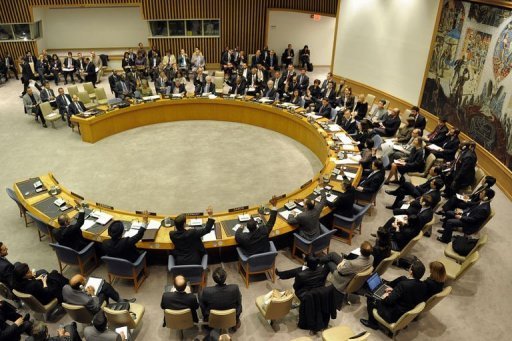UNSC discusses draft resolution to establish ban on "all flights" in Libyan airspace in order to help protect civilians
 United Nations Security Council supporters of a no-fly zone over Libya tried Wednesday to persuade reluctant members of the UN's most powerful body to back a resolution aimed at preventing Libyan long-time ruler Moammar Gaddafi’s planes from conducting aerial attacks on the Libyan people.
United Nations Security Council supporters of a no-fly zone over Libya tried Wednesday to persuade reluctant members of the UN's most powerful body to back a resolution aimed at preventing Libyan long-time ruler Moammar Gaddafi’s planes from conducting aerial attacks on the Libyan people.
The hesitation among some council members over a no-fly zone was immediately apparent after the proposed resolution was introduced Tuesday afternoon in the 15-member Security Council.
While Russia and Germany expressed doubts, France pushed for rapid action with Foreign Minister Alain Juppe saying in Paris that several Arab countries have pledged to participate in possible military action in the North African country.
The council met behind closed doors late Wednesday morning to continue discussions of the draft resolution.
Britain's U.N. Ambassador Mark Lyall Grant said supporters would go over the text "paragraph by paragraph" because members had "a number of questions about the text."
Lebanese Ambassador Nawaf Salam said he would urge council members "to move swiftly" amid reports that Libyan government troops would soon focus on the rebel stronghold of Benghazi. Salam said because Libyan diplomats at the UN had asked for a no-fly zone, and the Arab League had approved such a flight ban, "it is not foreign intervention, it is international legality."
US mission spokesman Mark Kornblau did not say if the United States would back a flight ban, but said American diplomats were "actively engaged on the text" of the resolution as instructed by President Obama during a national security council meeting on Tuesday. "We are hoping to focus the efforts of the international community on actions that will a have a real influence on events," Kornblau said without elaborating.
Meanwhile, UN Secretary-General Ban Ki-moon was urging all sides in Libya to accept an immediate cease-fire. UN spokesman Martin Nesirky said Wednesday that Ban "is gravely concerned about the increasing military escalation by government forces, which include indications of an assault on the city of Benghazi." The UN chief warned that "a campaign to bombard such an urban center would massively place civilian lives at risk," Nesirky said.
The latest push for a ban on flights in Libya came as Gaddafi’s forces intensified offensives in the east and the west Wednesday with relentless shelling aimed at routing protesters’ holdouts.
The fighters braced for a possible attack on the eastern city of Benghazi, where the Intifada was born a month ago. But Gaddafi's son, Seif al-Islam, warned them that government troops were closing in on Benghazi and urged them to leave the country. "Within 48 hours everything will be finished," he said in an interview with Lyon, France-based EuroNews television.
Colombian Ambassador Nestor Osorio said Wednesday his country "very much supported" efforts to halt violence against Libyan civilians but still had questions about the details of a possible no-fly zone.
